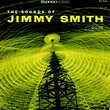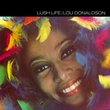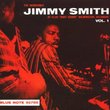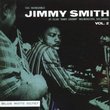| All Artists: Jimmy Smith Title: Fats Waller Members Wishing: 0 Total Copies: 0 Label: Blue Note Records Original Release Date: 1/1/2008 Re-Release Date: 9/2/2008 Album Type: Original recording remastered Genres: Blues, Jazz, Pop Styles: Soul-Jazz & Boogaloo, Bebop Number of Discs: 1 SwapaCD Credits: 1 |
Search - Jimmy Smith :: Fats Waller
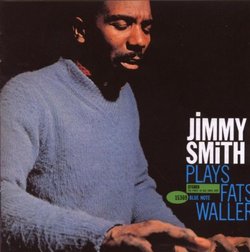 | Jimmy Smith Fats Waller Genres: Blues, Jazz, Pop
Limited edition Japanese remastered pressing. Bluenote. 2005. |
Larger Image |
CD DetailsSynopsis
Album Description Limited edition Japanese remastered pressing. Bluenote. 2005. Similar CDs
|
CD ReviewsUnique but brief tribute album Gary Coffrin | San Jose, California, USA | 08/05/2007 (3 out of 5 stars) "Jimmy Smith, who re-defined jazz organ in the 1950's and 1960's, never recorded a bad album (although he did record some mediocre ones after 1970). This album will please many Smith fans for its selection of classic tunes and disappoint some Waller enthusiasts. Fats Waller (1904-43) was the first organist in jazz. Additionally, Waller wrote 300+ songs, including several keyboard instrumentals. However, only two of the seven selections here were written by Waller - although all had been recorded by Waller. Fats Waller swung as hard as any pianist ever and his left hand had enormous power and drive. However, Jimmy Smith never tries to play anything resembling stride, seldom using his left hand other than to change registration. Fats Waller recorded over 600 songs, so any tribute album must be selective. However, this album is just plain skimpy, logging in at a mere 35 minutes. On this CD, rhythm guitarist Quentin Warren offers workman-like support, but never solos. The superb drummer Donald Bailey provides tasteful timekeeping, but likewise never gets a chance to solo or have meaningful interchanges with Smith. [Note: If you want to hear Smith at his best, I recommend Back at the Chicken Shack from 1960. Smith shines when challenged by Stanley Turrentine (tenor) and Kenny Burrell (guitar).] The unique CD has Smith playing hits of an earlier era, but it is sometimes light on swing and short on energy (particularly in the first three selections). This brief album will appeal mainly to Smith collectors and curiosity seekers. That said, this album is not terrible and might deserve more than three stars if there were more selections." The mighty organ versus the mighty fats D. Cooke | London, England | 10/09/2008 (2 out of 5 stars) "Is this what you would expect from the meeting of the two mighty ones? Not entirely. The material is certainly there in the Fats Waller music and the playing skills of the organ-meister. But somehow it didn't hit the heights I expected not acheive the depth of tone richness we have come to expect from Jimmy Smith works. I think a great deal of this was down to a very basic remastering that left the sound in mono which was offputting to say the least. Feel a bit cheated by what was a very ordinary production." Why the Negativity? Gerrit R. Hatcher | 03/31/2010 (4 out of 5 stars) "This album is not a cooking soul-jazz or hard-bop session, which may be what some of the other reviewers were expecting. I admit, I even expected a bit more classic Jimmy Smith sound here (speedy lines and huge climaxes are conspicuously not present), but frankly this album's deeply laid back approach is very well executed to say the least. Considering the collaborations Smith led with soul jazzers like Stanley Turrentine at this time, this must have seemed a change of pace in 1962 as well.
Some have pointed to this program's oddly low proportion of actual Fats Waller tunes, but most jazz artists, including Waller, are best remembered through strong compositions of their own, and standards that they made their own. Sonny Rollins did a Bird tribute on Prestige without even one of Charlie Parkers compositions explicitly played, and easily pulled it off, this album would be too concept-y and monotonous if it kept exclusively to tunes Waller wrote, whilst ignoring obvious choices such as Lulu's Back in Town. This is far from my favorite Jimmy Smith album, and certainly not on the short list of his strongest, but when I saw the relatively negative reviews posted here, it became clear one thing needed to be addressed- this album is successful in the goal its title sets out, and is very enjoyable along the way. Jimmy is with his working group (a wise choice) and the prevailing atmosphere is one of extreme comfortability. Unlike other dates from this time, the songs have a wide range of different progressions, and are not all blues-based, and its nice to hear Smith negotiate some swing-era type tunes. The remastering here is fine, if not arresting.The organ somehow sounds very distant, which actually gives you a nice sense of space more than anything else, and the album is very much in Stereo (the RVG edition)." |

 Track Listings (7) - Disc #1
Track Listings (7) - Disc #1